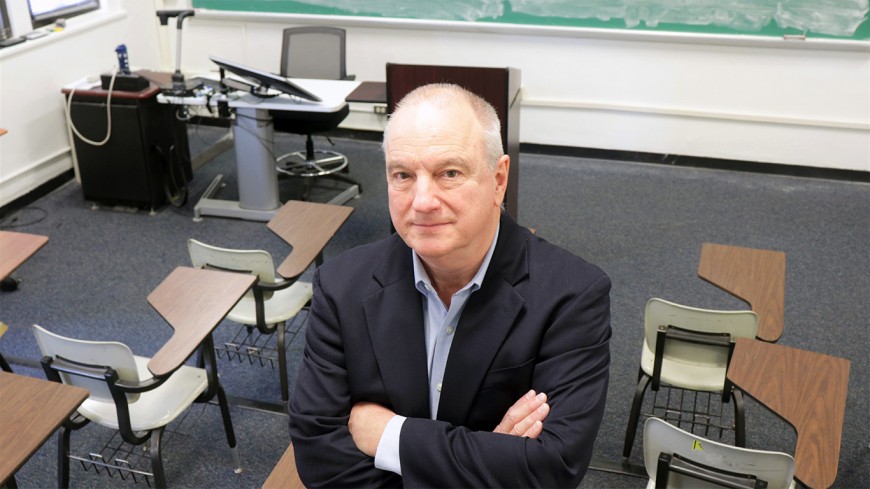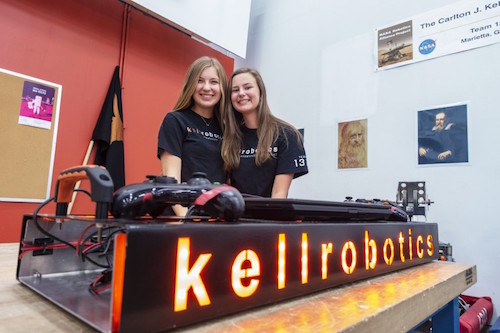More Than a Robot Factory: Robotics Team Mentored by School of Public Policy Graduate Student Also Advocates for Broader Access to STEM Education

By Michael Pearson
If given just one word to describe the robotics team mentored by School of Public Policy graduate student Ed Barker, you wouldn’t go wrong choosing “winner.” After all, Barker’s Kell Robotics team is just one of 29 teams inducted into the FIRST Robotics Competition Hall of Fame, and serves as a role model to the 61,000 teams worldwide.
But for all the circuits and pneumatics and flashing lights, Kell Robotics is more than just a robot factory. Under the tutelage of Barker — a self-professed student of “challenging, seemingly impossible problems” — it’s become something of a public policy powerhouse, too. This team grounded in science has made an art of pressing Georgia leaders to adopt solutions to a desperate shortage of secondary-level teachers in science, technology, engineering, and math (STEM).
The students involved in Kell Robotics — including two incoming Georgia Tech engineering students — have logged hundreds of interactions with state lawmakers, policymakers, corporate leaders, educational groups, and others over the last 15 years. In all, that’s hundreds of hours advocating for programs to help turn out thousands of desperately needed STEM teachers for Georgia middle and high schools.
“Public policy doesn’t change overnight,” said Danielle Newman, an incoming first-year mechanical engineering student. “Through FIRST, we try to speed up the process by letting students tell their stories.”
Two First-Year Students Thrived as Part of Kell Team

What a story Newman can tell. She always wanted to attend Georgia Tech, going back to the days her Girl Scout troop would come to campus for workshops. Later, her middle school robotics team participated in competitions hosted on the Georgia Tech campus.
“But Kell Robotics is what made me realize that mechanical engineering was the career for me,” she said, “FIRST taught me not only how to use computer assisted design software, but how to design. It helped me learn about tools and parts, like the difference between a shaft collar and a shaft coupler. It prepared me with background knowledge that will help me succeed in class. And it taught me to be a leader.”
Newman’s fellow Kell team member, Mackenzie Sickard, also is set to start her Georgia Tech career this fall as part of the prestigious Clark Scholars Program. She will study industrial engineering.
Her experience with FIRST only cemented a lifelong desire to go to Georgia Tech.
“When I was a kid, I fell in love with science and wanted to go to Tech because it’s the best school in the world,” she said.
Stories like these inspire Barker to believe he knows where to find enough teachers to flood Georgia middle- and high-school classrooms with well-trained STEM teachers.
“They’re right there,” Barker says, pointing down a hallway in the Kennesaw warehouse where Newman, Sickard, and other Kell Robotics team members are tinkering with their latest robot. “We have a thousand FIRST teams in Georgia. Somewhere in that pool are enough people to become STEM teachers.”
A Solution to the STEM Shortage?
The lack of STEM teachers is a national problem, with numerous studies indicating that school districts across the country report difficulties in finding and hiring fully certified STEM teachers.
Several years ago, Barker’s team pored over state educational data and found just 43 courses in engineering, technology, and computer science in Georgia middle and high schools. What’s more, they found Georgia colleges and universities were turning out virtually no STEM-focused education graduates to help expand the number of such courses.
To help solve the issue, the Kell Robotics team is advocating for new Bachelor and Master of Arts in Education that would turn out graduates with specializations in engineering, robotics, game design, computer programming, networking, and cybersecurity to teach STEM classes in Georgia schools.
The team estimates that as many as 20,000 students would enroll in high-school technology, engineering, and manufacturing-related courses if they were broadly available. Another 5,400 would enroll in computing and information technology courses.
Barker: Georgia Tech the Right Place to Study this Problem
Barker, who is the assistant director of advanced computing services at Kennesaw State University, is pursuing a master’s degree in the Georgia Tech School of Public Policy, a unit of the Ivan Allen College of Liberal Arts. He is making solving the state’s STEM teacher problem a core focus of his graduate work.
“Casual observers tend to think I study education, but what I am working on is how to understand and approach challenging, seemingly impossible problems,” he said. “These are the types of issues where no single entity is in charge. From this perspective, fixing STEM teacher development is as messy as climate change, or cybersecurity, or a dozen other items.”
He is particularly interested in the theory of strategic action fields (SAF).
“At a basic level, it is how an ocean of people and institutions collectively decide to move in a direction, not unlike a giant school of fish,” he said. “My goal is to help advance knowledge of SAF theory, which hopefully will help us all understand how to address the significant problems in the world.”
Seeking to understand such problems is, of course, a hallmark of scholarship in the Ivan Allen College of Liberal Arts, where complex problem solving bridging the technological and non-technological realms is the primary distinguishing characteristic of graduates.
So studying such issues at Georgia Tech’s School of Public Policy was a no-brainer, Barker said.
“Georgia Tech provides a wealth of talent and expertise in how to develop policy analysts and researchers who work at the intersection of STEM activities, economic development, and governance,” he said. “At Georgia Tech, students can develop robust policy analysis and implementation skills with a perspective that is unique in the policy field internationally.”

